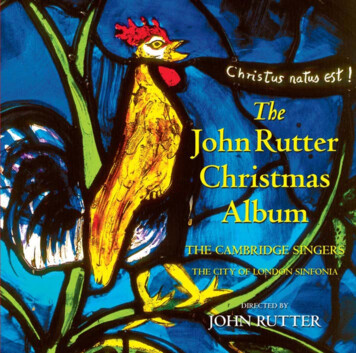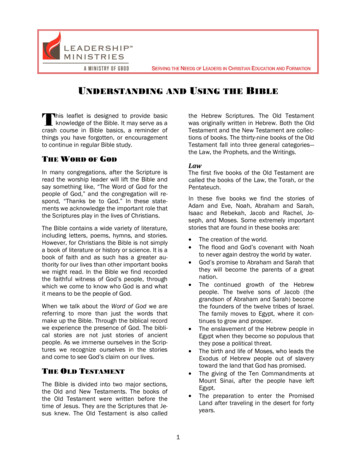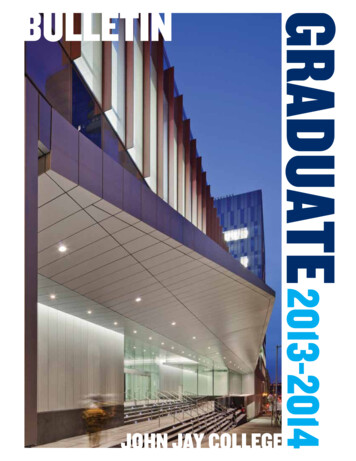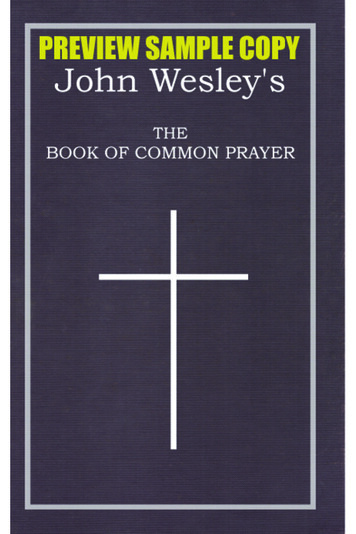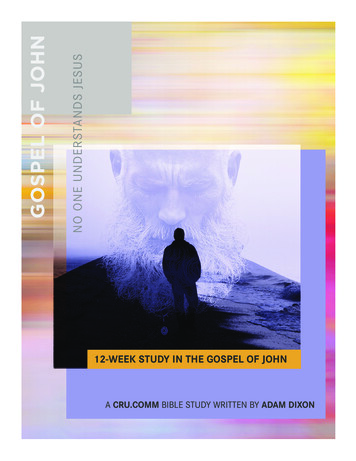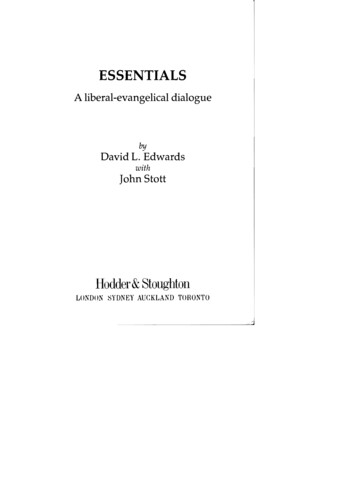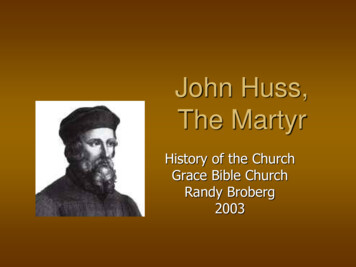
Transcription
John Huss,The MartyrHistory of the ChurchGrace Bible ChurchRandy Broberg2003
John Huss (or Jan Hus) c. 1370-1415 John Huss begins lecturingon theology at PragueUniversity and spreadsWycliffe's ideas.The theological writings ofWycliffe spread widely inBohemia. Huss was greatlymoved by them.Huss was especiallyimpressed with the critiquesagainst the power anddominion of the church intemporal matters.
Huss: Vernacular Bible Preacher, 1402 In 1402 Huss wasappointed preacher ofthe Bethlehem Churchin Prague, where hepreached in the Czechlanguage.This church waspurely for sermonsand held 3,000people!Huss’ sermonscriticize theimmorality of societyand especially theclergy’s avarice andSimony.PulpitBethlehem Chapel Interior
Abuses: attacked clerical power and privileges.Membership: the Church is “the congregation of thefaithful to be saved the totality of thepredestined” as distinct from the “church ofthe reprobate, headed by the devil.” Neither external membership in the Churchnor churchly offices and dignities are asurety that the persons in question aremembers of the true Church. the Church is not that hierarchy which isgenerally designated as Church; the Churchis the entire body of those who from eternityhave been predestined for salvation.On Church and State: separate spheres of civil and churchlypower;Celibacy: “Didn’t God ordain marriage as a means tosatisfy the craving for love in all men?”Huss On theChurchBethlehem Chapel in Prague
“ManyHuss on thePapacyPopes were heretics orevil.” “It is no article of faith thatone must obey the Pope to besaved.” “Christ is head of the church,not the Pope.” No Pope is the manifest andtrue successor of Peter, theprince of the apostles, if inmorals he lives at variancewith the principles of Peter;and if he is avaricious, then is thevicar of Judas, who loved thereward of iniquity and sold JesusChrist . . .“As for the argument that thePope is the most holy father whocannot sin, I deny it; for it is ourFather most holy, the Lord God,who alone cannot sin.”
Indulgences,1411 Picture of an IndulgenceIn 1411 in Prague there developed a traffic inindulgences.Huss, following the example of Wycliffe,opposed them in his Cruciata.A few days afterward the people, led by Wokof Waldstein, burnt the papal bulls.Huss, they said, should be obeyed rather thanthe fraudulent mob of adulterers andSimonists.The faculty requested Huss to present hisspeeches and doctrines to the dean for anexamination, but he refused. In the mean timethe faculty had condemned the ideas of Huss.in 1412, when he preached against theindulgences that the third Pope (now JohnXXIII) was selling with King Wenceslas tofinance his struggle against the other twoPopes, the king became angry with Hus. Nowthere was no protector.
Huss onIndulgences“Man obtains forgiveness of sins byreal repentance, not for money. ““It is not possible for a priest to looseor bind anything, unless such loosingand binding takes place in heaven;. . .The ignorant think that the priestbinds and looses in time first andafter him God. It is folly to have thisopinion. God’s act of binding orloosing is absolutely first. And it isevident, it would be blasphemy toassert that a man may remit anoffense done to so great a Lord,without the Lord himself approvingthe remission . . . ““Nothing appears more godless to methan to commercialize the forgivenessof sins, to deceive people thatheaven might be bought for a fewfarthings.”
On Scripture Supported vernacular translations ofthe Bible.the supremacy of the Bible'sauthority over the Church;Other HussiteDoctrinesOn The Eucharist Critical of traditional ceremonies andsuperstitious practices relating to theEucharist.Bread and wine remained bread andwine.that Communion should be served "inboth kinds," that is, both the breadand the cup.The doctrine of transubstantiation isrepugnant to me. Just as nobody canreally create blood out of water andwine, so nobody an create flesh outof dough.”The Chalicebecame a symbol of Hussism
1409, Huss Becomes Rector ofUniversity of Prague In 1409 when the Council of Pisawas trying to depose the twoPopes and elect a third, Huss andthe reformers supported themove while the archbishop andthe German faculty of theuniversity (which outnumberedthe Czechs) opposed it.King Wenceslas of Bohemiachanged the charter of theuniversity to allow Czech votes tooutnumber German votes. Inresponse, the Germans withdrewto other universities, includingfounding the university of Leipzig.Huss was now elected rector ofthe university of Prague.
The Beginning of the End, 1408-11 1408, Huss defends Wycliffeagainst condemnation. Thearchbishop brought hiscomplaints to the Pope,accusing the Wycliffites as theinstigators of all ecclesiasticaldisturbances in Bohemia.1409 Pope issued his bullempowering the archbishop toproceed against Wycliffism-- allbooks of Wycliffe were to begiven up, his doctrines revoked,and free preachingdiscontinued."Even if I should standbefore the stake whichhas been prepared forme, I would neveraccept therecommendation of thetheological faculty."
Huss in Exile 1410 Huss banned from preaching in allchapels (and with that in the BethlehemChurch) as a WycliffiteHe continued to preach in the Bethlehemchapel, and became bolder and bolder in hisaccusations of the Church.Interdict was pronounced against Prague.1411, Huss is excommunicated and must leavePrague.The Bohemian nobles take up the cause andgive Huss protection in their castles during theensuing years until 1414.At the castle of one of his protectors Husswrote treatises with the result that BohemianWycliffism was carried into Poland, Hungary,Croatia, and Austria.
The Council ofConstance, 1414 Huss goes voluntarily, and with Imperial safe conduct, toa general council of the Church at Constance.From the sermons which he took along, it is evident thathe purposed to convert the assembled fathers to his own(i.e., Wycliffe's) principal doctrines.In the beginning Huss was at liberty, but after a few weekshis opponents imprisoned him for seventy-three days,separated from his friends, chained day and night, poorlyfed, and tortured by disease.
The Predestination “Errors” of John HussAccording toTHE COUNCIL OF CONSTANCE 1 One and only is the holy universal Church which is theaggregate of the predestined.21. The grace of predestination is a chain by which the bodyof the Church and any member of it are joined insolubly toChrist the Head
“Errors” of Huss, According to Councilof Constance: Papacy 7. Peter is not nor ever was the head of the Holy Catholic Church.9. The papal dignity has sprung up from Caesar, and the perfection andinstitution of the pope have emanated from the power of Caesar.10. No one without revelation would have asserted reasonably regardinghimself or anyone else that he was the head of a particular church, nor is theRoman Pontiff the head of a particular Roman Church.12. No one takes the place of Christ or of Peter unless he follows him incharacter, since no other succession is more important .13. The pope is not the true and manifest successor of Peter, the first of theapostles, if he lives in a manner contrary to Peter; and if he be avaricious, thenhe is the vicar of Judas Iscariot .20. If the Pope is wicked and especially if he is foreknown, then as Judas, theApostle, he is of the devil, a thief, and a son of perdition, and he is not the headof the holy militant Church, since he is not a member of it.28. Christ through His true disciples scattered through the world would ruleHis Church better without such monstrous heads.
“I will recant if you instructme by better and morerelevant Scripture.Otherwise, I fear to do so,lest I be a liar in the sight ofthe Lord and also lest Ioffend my own conscienceand the truth of God.”Trial of Huss On June 5 he was tried for thefirst time.He acknowledged the writingsas his own, and declaredhimself willing to recant, iferrors should be proven tohim. If his reasons and Bibletexts did not suffice, he wouldbe glad to be instructed.After the trial several otherattempts were made to inducehim to recant, but he resistedall of them.
Condemnation and Execution The condemnation took place in the cathedral. After the performanceof high mass and liturgy, Huss was led into the church. The bishop ofLodi delivered an oration on the duty of eradicating heresy; then sometheses of Huss and Wycliffe and a report of his trial were read.He protested loudly several times, and when his appeal to Christ wasrejected as a condemnable heresy, he exclaimed, An Italian prelatepronounced the sentence of condemnation upon Huss and hiswritings.Again he protested loudly, saying that even at this hour he did notwish anything but to be convinced from Holy Scripture.He fell upon his knees and asked God with a low voice to forgive allhis enemies.Then followed his degradation--he was enrobed in priestly vestmentsand again asked to recant; again he refused.With curses his ornaments were taken from him, his priestly tonsurewas destroyed, and the sentence was pronounced that the Churchhad deprived him of all rights and delivered him to the secularpowers.
Huss Burned AtThe Stake, 1415 Thus Huss was led away to the stakewith a high paper hat upon his head,with the inscription “Heretic”.At the place of execution he kneltdown, spread out his hands, andprayed aloud.Some of the people asked that aconfessor should he given him, but apriest exclaimed, a heretic shouldneither be heard nor given a confessor.The executioners undressed Huss andtied his hands behind his back withropes, and his neck with a chain to astake around which wood and strawhad been piled up so that it coveredhim to the neck.Thereupon the fire was kindled.
John Huss’ Last WordsGod is my witness, I have never taught that of which I have been accused by falsewitnesses. The evidence against me is false. I have never thought nor preachedexcept with the one intention of winning men, if possible, from their sins. I amwilling, patiently and publicly to endure this dreadful, shameful and cruel death forthe sake of they gospel and the preaching of thy Word. In the truth of the Gospelwhich I have written, taught, and preached I will die to-day with gladness. Into thyhands, O Lord, I commend my spirit. " With uplifted voice Huss sang, "Christ,thou Son of the living God, have mercyupon me." When he started this for thethird time and continued "who art bornof Mary the virgin," the wind blew theflame into his face; he still moved lipsand head, and then died of suffocation.His clothes were thrown into the fire,his ashes gathered and cast into thenearby Rhine.
Effect in Bohemia of Death of Huss The Czech people, who in his lifetime hadloved Huss as their prophet and apostle, nowadored him as their saint and martyr.A league was formed by certain lords whopledged themselves to protect the freepreaching of the Gospel upon all theirpossessions and estates, and to obey thepower of the bishops only in case their ordersaccorded with the injunctions of the Bible.The entire Hussite nobility joined the league,and if the king had entered it, its resolutionswould have received the sanction of the law;but he refused, and approached the RomanCatholic league of lords, which was nowformed, the members pledging themselves tocling to the king, the Roman Church, and theCouncil.
The news of the death of KingWenceslaus produced a revolution sweptover the country; churches andmonasteries were destroyed, and theecclesiastical possessions were seized bythe Hussite nobility.Emperor Sigismund could get possessionof his kingdom only by the power of arms.Hussite statesmen and army leaders had toleave the country, and Roman priests werereinstituted.Apart from their religious aims, Hussitesfought for the national interests of theCzechs.The moderate and radical parties wereunited and they not only repelled theattacks of the army of crusaders, butentered the neighboring countries.Hussites AfterHuss
Four Articles of Prague The program of the more conservative Hussites iscontained in the four articles of Prague, which wereagreed upon in July, 1420, and promulgated in theLatin, Czech, and German languages: (1) freedom of preaching; (2) communion in both kinds; (3) poverty of the clergy and expropriation ofchurch property; (4) punishment of notorious sinners“
Hussites Split Overthe “Regulative Principle” Luther Like Ultraquists: Only that part of RomanCatholicism that is forbidden byScripture should be eliminated.Calvin Like Taborites: Reject all in faith and practice ofRoman Catholocism that cannotbe established from Scripture. they preached the sufficientialegis Christi--only the divinelaw (i.e., the Bible) is the ruleand canon for man, and that notonly in ecclesiastical matters,but also in political and civilmatters.
Ultraquists Portrait of a LadyThe so-called moderatesUltraquists left the wholehierarchical and liturgical order ofthe Church untouched;Considered the moderate Hussitesrepresented at the university andamong the citizens of Pragueemphasized the second article(wine)chalice became their emblem.They repelled two attacks onBohemia and grew in power.
Taborites Taborites identified with the doctrines ofWycliffe, hated the monastic clergy, and,attempted to lead the Church back to itscondition during the time of the apostles, whichnecessitated the removal of the existinghierarchy and the secularization of ecclesiasticalpossessions.They rejected therefore, as early as 1416,everything that has no basis in the Bible, as theadoration of saints and pictures, fasts,superfluous holidays, the oath, intercession forthe dead, auricular confession, indulgences, thesacraments of confirmation and extremeunction, admitted laymen and women to thepreacher's office, chose their own priests.But before everything they clung to Wyclif'sdoctrine of the Lord's Supper, denyingtransubstantiation, and this is the principal pointby which they are distinguished from themoderate party.
Pope Calls for Crusade AgainstBohemia’s Heretics, 1427 The Taborites founded a city upon aneighboring hill, which they calledTabor; hence they were called Taborites.Pope Martin V called upon all Christiansof the west to take up arms against theHussites, and there followed a twelveyears' war which was carried on by theHussites at first defensively, but after1427 they assumed the offensive.Taborites were premillenial, believed theLord’s return was imminent and that theRCC was the “whore of Babylon.”
In 1431 peace negotiations began with theCouncil of Basel.After repeated negotiations between Basel andBohemia, a Bohemian-Moravian state assemblyaccepted the Compactata of Prague in 1433.Communion in both kinds was granted to all whodesired it, but with the understanding that Christwas entirely present in each kind.Free preaching was granted conditionally; priestsmust be approved and sent by their superiors, andthe power of the bishop must be considered.The article which prohibits the secular power of theclergy was almost reversed.The Taborites refused to conform, and theUltraquists united with the Roman Catholics anddestroyed the Taborites in the battle of Lipan(1434).Thus the reconciliation of Bohemia with Rome andthe Western Church was accomplished, and nowSigismund first obtained possession of theBohemian crown.TheCouncil ofBasel andCompactaof Prague,1433-34
The Hussite“Brethren” 1467 Another segment of Hussites,Unitas Fratrum, set up anindependent organization in 1467It lasted until the CounterReformation.communicated with otherProtestants after the outbreak ofthe Reformation, although it waslater suppressed in the religiouswars.This group became the precursorsof the Moravian church, later tobecome so influential in the life ofJohn Wesley.
Luther and Huss Luther's appearance washailed by the Utraquist clergy,and Luther himself wasastonished to find so manypoints of agreement betweenthe doctrines of Huss and hisown.
Bohemian Confession, 1575 Philip MelancthonUnder Maximilian II, the Bohemianstate assembly established theConfessio Bohemica, upon whichLutherans, Reformed, and BohemianBrethren agreed.At the time of the Reformation thereis a move towards reconciliationbetween the Hussites and theReformation;the Confessio Bohemica, theBohemian Confession of Faith,closely follows the ConfessioAugustana, the Confession ofAugsburg, drawn up by PhilipMelanchthon.
Catholics Defeat Remaining HussitesDuring 30 Years War,1620 The Thirty Years War startedwith fights between Catholicsand Protestants in BohemiaHussism was completelyeradicated only after the battleat the White Mountain (Nov. 8,1620) after which theUtraquist Hussites wee “finallyabsorbed by the RomanCatholics." (Britannica)
Who was right about the regulative principle?Those who say that whatever Scripture doesnot forbid is allowed or those who saywhatever is not commanded in Scripture is notpermitted?If you’re a Taborite, do you want to sing onlyPsalms?If you’re a Taborite, on what Biblical text doyou justify having Sunday School?If you’re an Ultraquist, is it alright toaccommodate our culture in the churchworship service? Where does Ultraquist-ismstop and being “seeker sensitive begin”?How many church controversies today can beviewed as debates between Ultraquists andTaborites?What Protestant denominations are the mostUltraquist and the most Taborite?Do sacramental, ritualistic churches andcontemporary casual churches like CalvaryChapels share being Ultraquist?Questions toConsider
May 31, 2012 · Indulgences, 1411 In 1411 in Prague there developed a traffic in indulgences. Huss, following the example of Wycliffe, opposed them in his Cruciata. A few days afterward the people, led by Wok of Waldstein, burnt the papal bulls. Huss, they said, should b

